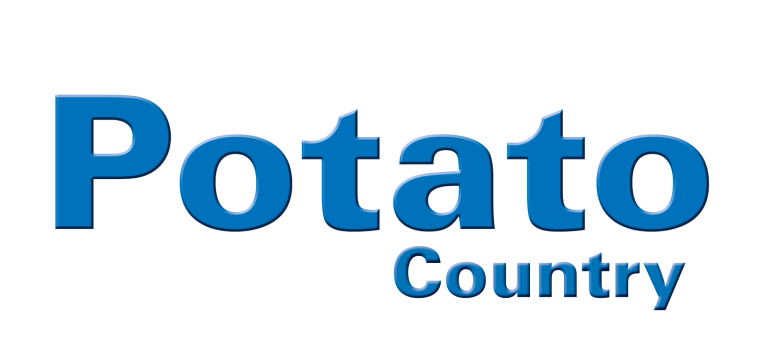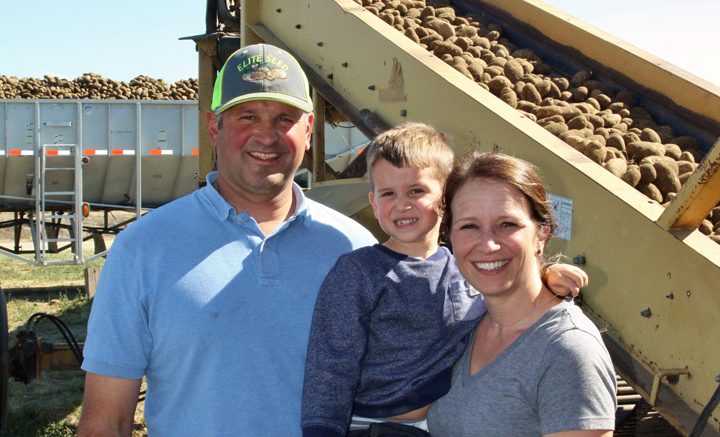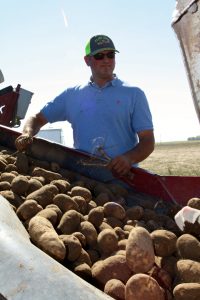Story and photos by Denise Keller
You can take the girl off the farm, but you can’t take farming out of the girl. At least that seems to ring true in Jenn Bunger’s case. A single summer away from the family farm was enough for Jenn to know where she belonged. She returned to farm alongside her dad and then on her own and now farms with her husband, Josh. Together, they are tackling the challenges, celebrating the successes and setting goals for their growing operation.
Daughter, Farmer, Partner
After growing up working for her dad, Jack Holzer, a process potato grower in Pasco, Washington, Jenn earned her degree and started a nursing career in Western Washington. But the first summer away from the farm was miserable, she recalls.
“I have always been a tomboy. I love machinery. I love getting dirty,” she says.
The new nurse began cramming all of her shifts at the hospital into one week, allowing her the next week to drive home and work on the farm. While pulling double duty, she convinced her dad that she was serious about farming. Wanting to keep operations separate, her dad instructed her to ask McCain Foods for a potato contract of her own. Holzer vouched for his daughter, and she was given a 90-acre contract in 2008. The fact that as a female farmer she was clearly in the minority was far from her focus.
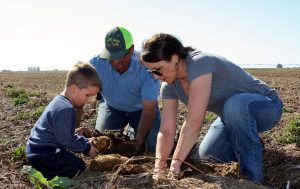
Josh and Jenn Bunger take a break from harvest to hand-dig some spuds with their four-year-old son, Elliot.
“I never really thought about it until people started saying things to me,” Jenn says, explaining that her grandfather died when she was two years old, and her grandmother, now 85, ran the farm solo for years. “She was the reason I didn’t think it was weird for a woman to farm on her own. I never thought that was strange until I realized there were no other women my age doing this.”
In 2011, Jenn married Josh, who had been working for a fresh potato grower for nearly a decade, and the couple established Bunger Farms. With a good working relationship with McCain, the farm’s spud contract was increased to 150 acres the next year and eventually bumped up to 300 acres two years ago.
“I am so lucky that my dad gave me the opportunity to farm and trusted that I would be responsible with it. I would not be where I am today without my dad. He taught me how to grow potatoes,” Jenn says. “Josh came with a wealth of knowledge, too. I started the farm out, but we have grown it together and I’m really proud of it.”
In the last few years, Jenn’s role on the farm has changed, as she balances farming with raising three children, four-year-old Elliot and two-year-old twins Paige and Piper, and continuing to work part-time as a nurse at a local hospital. While she has let go of some of her daily duties such as managing water and herbicide applications, she still enjoys swathing, raking and baling hay and driving 10-wheelers during potato harvest.
“I love working with my husband,” Jenn says. “There are two sets of watchful eyes on the farm.”
Josh agrees, appreciating his and Jenn’s shared interest in potatoes and valuing his wife’s level of experience and knowledge in farm operations.
“Having someone with on-the-farm experience doing the books has been beneficial,” he adds.
Challenges, Successes, Goals
The Bungers currently farm 1,000 acres consisting of potatoes, alfalfa and blue grass seed, along with some occasional green peas and sweet corn. Their 300 acres of Ranger Russets all go directly to the processor starting in early to mid-August.
As relatively new growers, the Bungers have been learning from neighboring farmers and trialing their own techniques to find what works best for their operation. They found two years ago that top dressing in lieu of pre-plant fertilizer has contributed to increased tonnage and nitrogen efficiency. Following planting, Josh applies fertilizer directly on each row and pushes nutrients up onto the tops and sides of the potato hills during cultivation, allowing nitrogen to get right to the potatoes.
Like other growers, the Bungers are also dealing with the loss of Vydate as a go-to product for in-season nematode control.
“With Vydate, you could put it on and go home and sleep at night knowing your plants were taken care of,” Josh describes, noting a lack of comparable alternatives on the market. “We miss that tool.”
While Josh has heard of problems in the area resulting from the lack of Vydate, Bunger Farms was fortunate to steer clear of nematode trouble in 2016, the grower says. Potato ground had low nematode counts and was double fumigated with Telone and Vapam as a safety net. The farm also maintains a four-year rotation as another preventative measure. However, in the absence of effective late-season nematode control, nematode populations may build over time, the grower worries.
In addition, Vydate helped increase plant vigor, Josh says. Without the product in 2016, it seemed tougher to keep plants alive later in the season, requiring additional applications of other chemicals to control insects and diseases.
Another common challenge is the scarce availability of good potato ground in the Columbia Basin. Being a new grower makes it slightly more difficult, Josh says, but many connections in the area have helped to locate and secure land. The Bungers rent a large acreage from a recently retired farmer who handpicked Jenn as a renter based on her impressive work ethic.
“That was a good thing that helped me get started on my own just because he was amused to see a girl drive a 10-wheeler and then head to the hospital for a shift,” Jenn recounts with a smile. “That was a good endorsement.”
Despite any challenges, 2016 was a milestone year for Bunger Farms, a year in which operations from planting through harvest were completed with the growers’ own newly purchased equipment. The farm had reached a size that it needed its own equipment; now the growers are hoping to increase potato production to offset the expense. Increasing contracted acreage is often easier said than done for fairly new growers in the process market, the Bungers say, but together they are up to the challenge.
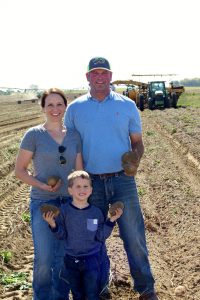
Josh and Jenn Bunger and their son, Elliot, show off some Ranger Russets harvested on their Pasco, Wash. farm.
Originally published by Potato Country magazine.
